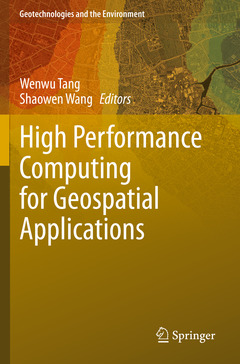High Performance Computing for Geospatial Applications, 1st ed. 2020 Geotechnologies and the Environment Series, Vol. 23
Coordonnateurs : Tang Wenwu, Wang Shaowen

This volume fills a research gap between the rapid development of High Performance Computing (HPC) approaches and their geospatial applications. With a focus on geospatial applications, the book discusses in detail how researchers apply HPC to tackle their geospatial problems. Based on this focus, the book identifies the opportunities and challenges revolving around geospatial applications of HPC. Readers are introduced to the fundamentals of HPC, and will learn how HPC methods are applied in various specific areas of geospatial study.
The book begins by discussing theoretical aspects and methodological uses of HPC within a geospatial context, including parallel algorithms, geospatial data handling, spatial analysis and modeling, and cartography and geovisualization. Then, specific domain applications of HPC are addressed in the contexts of earth science, land use and land cover change, urban studies, transportation studies, and social science. The book will be of interest to scientists and engineers who are interested in applying cutting-edge HPC technologies in their respective fields, as well as students and faculty engaged in geography, environmental science, social science, and computer science.
Dr. Shaowen Wang is a Professor and Head of the Department of Geography and Geographic Information Science; Richard and Margaret Romano Professorial Scholar; and an Affiliate Professor of the Department of Computer Science, Department of Urban and Regional Planning, and School of Information Sciences at the University of Illinois at Urbana-Champaign (UIUC). He has served as Founding Director of CyberGIS Center for Advanced Digital and Spatial Studies at UIUC since 2013. He served as Associate Director of the National Center for Supercomputing Applications (NCSA) for CyberGIS from 2010 to 2017, and Lead of NCSA’s Earth and Environment Theme from 2014 to 201
Fills the gap between the rapid development of High Performance Computing (HPC) approaches and their geospatial applications
Presents applications of HPC in geospatial domains, including ecology, land change science, urban studies, spatial epidemiology, earth science, environmental science, transportation studies, and social science
Uses several real-world examples to demonstrate how HPC can be used to collect, manage, and process geospatial big data
Date de parution : 07-2021
Ouvrage de 296 p.
15.5x23.5 cm
Disponible chez l'éditeur (délai d'approvisionnement : 15 jours).
Prix indicatif 158,24 €
Ajouter au panierDate de parution : 07-2020
Ouvrage de 296 p.
15.5x23.5 cm
Disponible chez l'éditeur (délai d'approvisionnement : 15 jours).
Prix indicatif 158,24 €
Ajouter au panier


